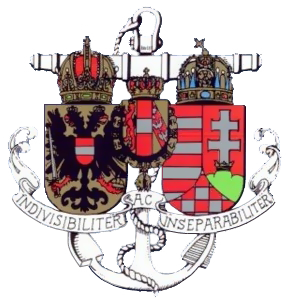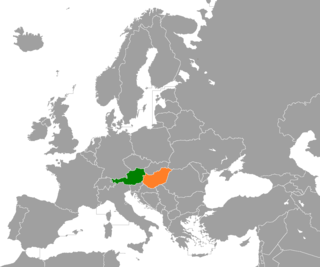
Austria-Hungary, often referred to as the Austro-Hungarian Empire or the Dual Monarchy, was a multi-national constitutional monarchy in Central Europe between 1867 and 1918. A military and diplomatic alliance, it consisted of two sovereign states with a single monarch who was titled both emperor of Austria and King of Hungary. Austria-Hungary constituted the last phase in the constitutional evolution of the Habsburg monarchy: it was formed with the Austro-Hungarian Compromise of 1867 in the aftermath of the Austro-Prussian War and was dissolved shortly after Hungary terminated the union with Austria on 31 October 1918.

Viennavee-EN-ə is the capital, most populous city, and one of nine federal states of Austria. It is Austria's primate city, with just over two million inhabitants. Its larger metropolitan area has a population of nearly 2.9 million, representing nearly one-third of the country's population. Vienna is the cultural, economic, and political center of the country, the fifth-largest city by population in the European Union, and the most-populous of the cities on the Danube river.

The economy of Austria is a highly developed social market economy, with the country being one of the fourteen richest in the world in terms of GDP per capita. Until the 1980s, many of Austria's largest industry firms were nationalised. In recent years, privatisation has reduced state holdings to a level comparable to other European economies. Among OECD nations, Austria has a highly efficient and strong social security system; social expenditure stood at roughly 29.4% of GDP.

The Austrian Armed Forces are the combined military forces of Austria.

Charles VI was Holy Roman Emperor and ruler of the Austrian Habsburg monarchy from 1711 until his death, succeeding his elder brother, Joseph I. He unsuccessfully claimed the throne of Spain following the death of his relative, Charles II. In 1708, he married Elisabeth Christine of Brunswick-Wolfenbüttel, by whom he had his four children: Leopold Johann, Maria Theresa, Maria Anna, and Maria Amalia.

Gesellschaft mit beschränkter Haftung, literally 'company with limited liability', is a type of legal entity in German-speaking countries. It is equivalent to a société à responsabilité limitée (Sàrl) in the French-speaking part of Switzerland and to a Società a Garanzia Limitata (Sagl) in the Italian-speaking part.

Styria is an Austrian state in the southeast of the country, famed for its idyllic landscapes, as well as rich folk- and high culture. With an area of 16,401 km2 (6,332 sq mi), Styria is Austria's second largest state, after Lower Austria. It is bordered to the south by Slovenia, and clockwise, from the southwest, by the other Austrian states of Carinthia, Salzburg, Upper Austria, Lower Austria, and Burgenland. The state's capital is Graz, the second largest city in Austria after only Vienna.

The Austrian Federal Railways, now commonly known as ÖBB, is the national railway company of Austria, and the administrator of Liechtenstein's railways. The ÖBB group is owned entirely by the Republic of Austria, and is divided into several separate businesses that manage the infrastructure and operate passenger and freight services.

The Austria national football team represents Austria in men's international football competitions, and is controlled by the Austrian Football Association.

Fußballklub Austria Wien AG, known in English as Austria Vienna, and usually shortened to Austria in German-speaking countries, is an Austrian professional association football club from the capital city of Vienna. It has won the most trophies of any Austrian club from the top flight, with 24 Austrian Bundesliga titles and 27 cup titles, although its rival SK Rapid Wien holds the record for most national championships with 32. Alongside Rapid, Austria is one of only two teams that have never been relegated from the Austrian top flight. With 27 victories in the Austrian Cup and six in the Austrian Supercup, Austria Wien is also the most successful club in each of those tournaments. The club reached the UEFA Cup Winners' Cup final in 1978, and the semi-finals of the European Cup the season after. The club plays at the Franz Horr Stadium, known as the Generali Arena since a 2010 naming rights deal with an Italian insurance company.
OMV is an Austrian multinational integrated oil, gas and petrochemical company which is headquartered in Vienna, Austria. The company is listed on the Vienna Stock Exchange. In the 2021 Forbes Global 2000, OMV Group was ranked as the 413th -largest public company in the world.

The Austro-Hungarian Navy or Imperial and Royal War Navy was the naval force of Austria-Hungary. Ships of the Austro-Hungarian Navy were designated SMS, for Seiner Majestät Schiff. The k.u.k. Kriegsmarine came into being after the formation of Austria-Hungary in 1867, and ceased to exist in 1918 upon the Empire's defeat and subsequent collapse at the end of World War I.
Austrian car number plates are mandatory vehicle registration plates displaying the registration mark of motor vehicles in Austria. They are used to verify street legality, proof of a valid liability insurance and to identify and recognise the vehicle.
Austrian Airlines AG, often shortened to Austrian or AUA, is the flag carrier of Austria and a subsidiary of Lufthansa, the flag carrier of the Federal Republic of Germany. The airline is headquartered on the grounds of Vienna International Airport in Schwechat where it also maintains its hub. As of July 2016, the airline flew to six domestic and more than 120 international year-round and seasonal destinations in 55 countries and is a member of the Star Alliance.

Cinema of Austria refers to the film industry based in Austria. Austria has had an active cinema industry since the early 20th century when it was the Austro-Hungarian Empire, and that has continued to the present day. Producer Sascha Kolowrat-Krakowsky, producer-director-writer Luise Kolm and the Austro-Hungarian directors Michael Curtiz and Alexander Korda were among the pioneers of early Austrian cinema. Several Austrian directors pursued careers in Weimar Germany and later in the United States, among them Fritz Lang, G. W. Pabst, Josef von Sternberg, Billy Wilder, Fred Zinnemann, and Otto Preminger.
Ö3 Austria Top 40 is the official Austrian singles chart, as well as the radio show which presents it, aired Tuesdays on Hitradio Ö3. The show presents the Austrian singles, ringtones and downloads chart. It premiered on 26 November 1968 as Disc Parade and was presented by Ernst Grissemann.

Neighbourly relations exist between Austria and Hungary, two member states of the European Union. Both countries have a long common history since the ruling dynasty of Austria, the Habsburgs, inherited the Hungarian throne in the 16th century. Both were part of the now-defunct Austro-Hungarian Empire from 1867 to 1918. The two countries established diplomatic relations in 1921, after their separation.

Postal codes in Austria were introduced in 1966. known locally as 'Postleitzahlen' are a fundamental aspect of the nation's logistical infrastructure, providing a systematic means of organizing mail delivery and geographical categorization. The term 'Postleitzahlen' translates to 'postal codes' in English.

Austria, formally the Republic of Austria, is a landlocked country in Central Europe, lying in the Eastern Alps. It is a federation of nine federal states, one of which is the capital, Vienna, the most populous city and federal state. Austria is bordered by Germany to the northwest, the Czech Republic to the north, Slovakia to the northeast, Hungary to the east, Slovenia and Italy to the south, and Switzerland and Liechtenstein to the west. The country occupies an area of 83,879 km2 (32,386 sq mi) and has a population of around 9 million.
T-Mobile Austria GmbH, trading as Magenta Telekom is the second largest mobile and fixed company in Austria. It is owned by Deutsche Telekom. In 2022 it had 5.2 million customers. Its CEO is Rodrigo Diehl since 1 October 2022.















